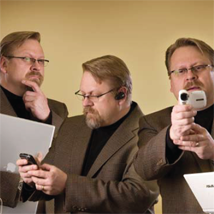Teaching used to be so wonderfully uncomplicated by technology, unless chalk and slate counted as innovation. Today, even traditional textbooks are threatened by electronic wizardry.
Today, even traditional textbooks are threatened by electronic wizardry.
And while teachers of just a decade ago needed to crack down only on note-passing to stop unwanted classroom communications, educators today are battling cellphones, iPods, Facebook, YouTube and three things invented while you were reading this paragraph, to keep student attention where it should be: at the front of the class.
Or should it? What if educators turned the tables on their recalcitrant learners and began using students’ own devices as teaching tools? Well, it’s happening and it’s a revolution that has Dwayne Harapnuik, Lethbridge College’s manager of educational technology, on the front line.
“If we know 21st century learners are different and discover how we can engage them, we can make meaningful connections with them and eventually help them to create learning on their own,” says Harapnuik. “Instructors need to learn what young people use to collaborate, then turn that knowledge to their own advantage.
“My goal is to help Lethbridge College instructors use technology to enhance learning for our students.”
Harapnuik holds a doctorate specializing in web-based education from the University of Alberta, the institution for whom he was working when Lethbridge College presented an intriguing offer: the chance to lead learning innovation here.
In his first year at Lethbridge College, Harapnuik has been determining the various levels of preparedness instructors have for learning, and understanding their priorities and what they want to accomplish. With a grasp on the details, he is now dovetailing those goals with available technology.
“We’re looking at the broad picture of where we’re going and how we want to get there. A lot of what we need to do is happening already.”
A consummate learner in his own right, Harapnuik monitors up to 60 educational websites, taking in up to 1,000 headlines a day from which to glean additional information. His readings have confirmed one tenet in which he believes: the only constant in education is change.
To ensure that change is exploited for the benefit of learners, Lethbridge College created the Educational Enhancement Team (EET), an evolution from services provided through the Flora Matteotti Centre for Teaching and Learning. The team took on the task of developing the Blended Learning Initiative (Wider Horizons, fall 2007) based on an idea proposed by Karen Harker, EET chair and curriculum and instruction consultant, Leanne Elias, Multimedia instructor, and Karen O’Dwyer, dean of the Centre for Teaching, Learning and Innovation. The project places student computer whizzes with technical advisors to assist instructors in integrating technology into their teaching. It’s just one way the college is embracing newer, effective learning methods. And that’s where Harapnuik’s talents come into play.
Harapnuik credits Harker for implementing the concept.
“Karen has done an amazing job at taking ideas and making them happen,” he says.
Many instructors are finding students want, indeed expect, learning to incorporate the Internet, whether it’s used as a research tool or a means of delivery on which they can download assignments, notes and other course details.
“We’re getting the pieces in place to create active and dynamic learning. Our Blended Learning initiative started it; now we have to provide the infrastructure for faculty to do their job.
Harapnuik says the college can change circumstances and conditions to create a cultural shift that will enhance learning for students and faculty.
“My role is behind the scenes,” he says. “I’m there to get the spark going.”
Part of that spark was ignited when O’Dwyer shared with Harker an opportunity to propose an eCampus Alberta faculty development project. Harapnuik worked with the team to develop a $25,000 eCampus-funded learning connectivity website.
Other strategies Implemented include the college’s Educational Technology Strategy; the Implementation of Joomla, a new content management system; and the start of full- and non-credit video conferencing course delivery.
This fall, Lethbridge College will conduct its first Student Technology Survey. This research will be similar to the ECAR Study of Undergraduate Students and Information Technology conducted by the American-based Educause Center for Applied Research, which provides an annual snapshot of the technology American students use in their lives.
“Interestingly, we already know many of our students have access to computers outside of the college, and many of them use cellphones,” says Harapnuik. “It’s information such as this that helps us chart a course for the future.
“The bottom line in all this is it’s about learners; they are our first priority.”


